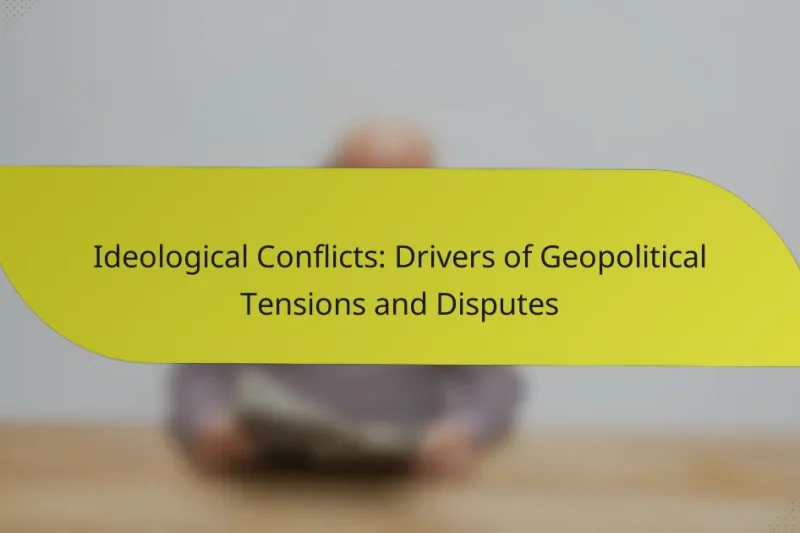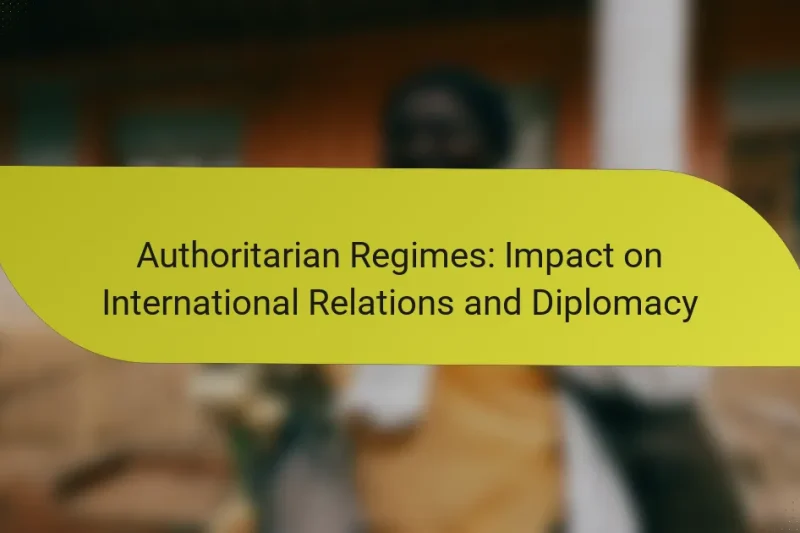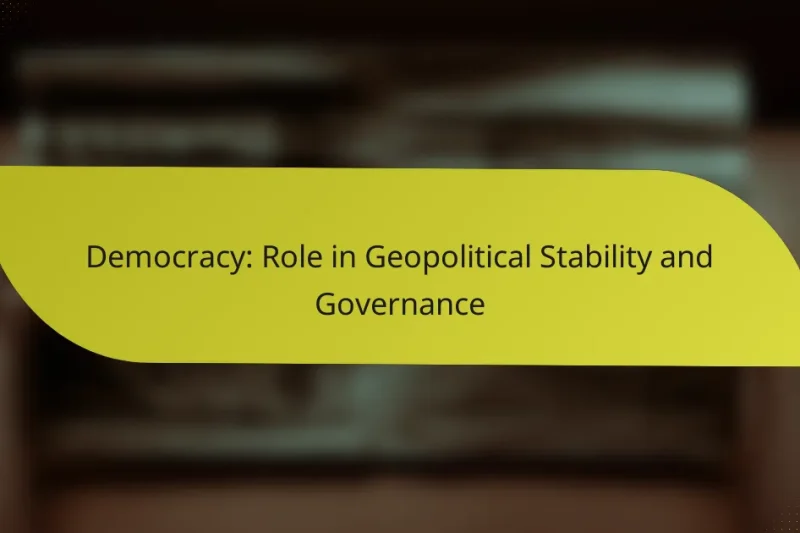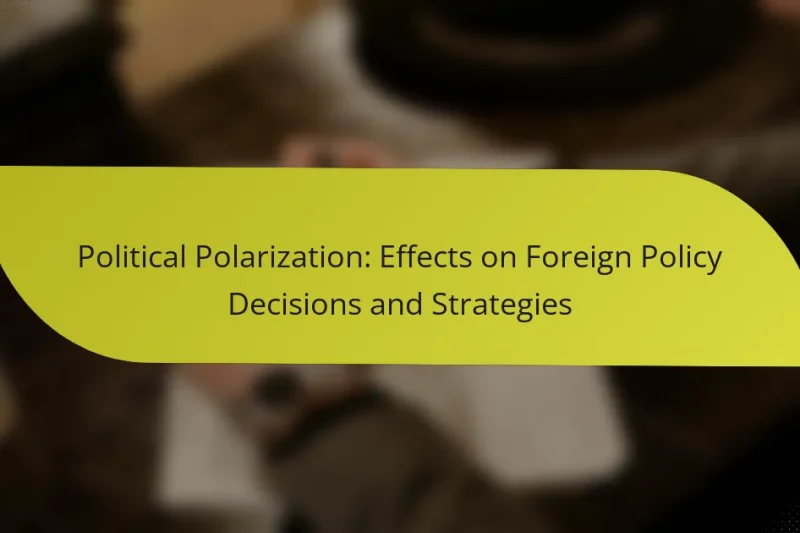Ideological conflicts serve as powerful drivers of geopolitical tensions, rooted in the beliefs and values that … Ideological Conflicts: Drivers of Geopolitical Tensions and DisputesRead more
Political Ideologies and Their Geopolitical Effects
Political ideologies play a crucial role in shaping the landscape of international relations, influencing how states engage with one another and address global issues. From socialism’s impact on economic policies to nationalism’s role in fostering identity and conflict, these ideologies dictate diplomatic strategies and alliances, ultimately affecting global stability and cooperation.
Authoritarian Regimes: Impact on International Relations and Diplomacy
Authoritarian regimes play a crucial role in shaping international relations, often prioritizing state control over individual … Authoritarian Regimes: Impact on International Relations and DiplomacyRead more
Democracy: Role in Geopolitical Stability and Governance
Democracy plays a crucial role in promoting geopolitical stability by enabling citizens to engage in dialogue … Democracy: Role in Geopolitical Stability and GovernanceRead more
Political Parties: Influence on International Trade Agreements and Policies
Political parties are instrumental in shaping international trade agreements and policies, as they establish the priorities … Political Parties: Influence on International Trade Agreements and PoliciesRead more
Populism: Influence on Global Political Trends and Movements
Populism has emerged as a powerful force in global politics, reshaping trends and movements by emphasizing … Populism: Influence on Global Political Trends and MovementsRead more
Political Polarization: Effects on Foreign Policy Decisions and Strategies
Political polarization in the United States profoundly influences foreign policy decisions and strategies, resulting in a … Political Polarization: Effects on Foreign Policy Decisions and StrategiesRead more
How do political ideologies influence international relations?
Political ideologies significantly shape international relations by determining how states interact, prioritize their interests, and respond to global challenges. These ideologies influence diplomatic strategies, alliances, and conflict resolutions, affecting global stability and cooperation.
Realism and power dynamics
Realism focuses on the idea that states act primarily in their own self-interest, emphasizing power and security. In this view, international relations are characterized by competition and conflict, where military strength and economic resources dictate a nation’s influence.
For example, a realist approach might lead a country to increase its military spending in response to perceived threats, prioritizing national security over cooperative agreements. This often results in a balance of power, where states seek to deter rivals through military capabilities.
Liberalism and cooperation
Liberalism emphasizes the potential for cooperation among states, advocating for international institutions and norms to facilitate collaboration. It posits that economic interdependence and democratic governance can lead to more peaceful relations and mutual benefits.
Countries that adopt a liberal approach may engage in trade agreements or participate in organizations like the United Nations to promote collective security and economic growth. This ideology suggests that shared interests can reduce the likelihood of conflict and foster stable partnerships.
Constructivism and identity
Constructivism highlights the role of social constructs, identities, and norms in shaping international relations. It argues that the perceptions and beliefs of states influence their behavior and interactions, making identity a critical factor in diplomacy.
For instance, a nation may align itself with others based on shared cultural or ideological values, impacting its foreign policy decisions. Understanding these identities can help predict how states will react to various international issues, emphasizing the importance of dialogue and cultural exchange in fostering cooperation.
What are the geopolitical effects of socialism?
Socialism can significantly influence geopolitical dynamics by shaping economic policies, altering trade relationships, and impacting regional stability. Countries adopting socialist ideologies often prioritize wealth redistribution and social welfare, which can lead to both cooperation and conflict with neighboring nations.
Socialist policies in Latin America
In Latin America, socialist policies have led to various economic reforms aimed at reducing inequality and enhancing social services. Countries like Venezuela and Cuba have implemented extensive state control over resources, which has resulted in both improvements in healthcare and education, as well as economic challenges, such as inflation and shortages.
These policies often foster a sense of solidarity among leftist governments, leading to regional alliances. However, they can also provoke tensions with capitalist-oriented nations, influencing diplomatic relations and regional politics.
Impact on trade agreements
Socialist governments may pursue trade agreements that prioritize social and environmental standards over purely economic gains. This can lead to the establishment of trade blocs focused on mutual aid rather than profit, as seen in initiatives like ALBA (Bolivarian Alliance for the Peoples of Our America).
However, these agreements can complicate relations with countries that favor free-market principles, potentially leading to trade disputes or sanctions. Nations must navigate these complexities to maintain beneficial trade relationships while adhering to their ideological commitments.
Socialism’s role in regional stability
Socialism can contribute to regional stability by promoting social equity and reducing poverty, which may decrease the likelihood of civil unrest. Countries with strong social programs often experience lower crime rates and greater public trust in government institutions.
Conversely, the implementation of socialist policies can also lead to polarization and conflict, particularly if economic outcomes do not meet public expectations. The balance between social equity and economic viability is crucial for maintaining stability in socialist-leaning regions.
How does nationalism shape global conflicts?
Nationalism significantly influences global conflicts by fostering a sense of identity and unity among people within a nation, often leading to tensions with other nations. This drive for self-determination can result in territorial disputes, civil unrest, and even wars as groups seek to assert their sovereignty or cultural identity.
Nationalism in Eastern Europe
In Eastern Europe, nationalism has played a pivotal role in shaping political landscapes, particularly after the dissolution of the Soviet Union. Countries like Ukraine and Hungary have experienced a resurgence of nationalist sentiments, often in response to perceived threats from neighboring nations or external influences.
This nationalism can manifest in various ways, including demands for greater autonomy, cultural preservation, and resistance to foreign intervention. The ongoing conflict in Ukraine illustrates how nationalism can escalate into broader geopolitical tensions, drawing in international actors and complicating regional stability.
Case studies of nationalist movements
Several nationalist movements have had profound impacts on global conflicts. The Balkan Wars in the early 20th century were fueled by nationalist aspirations, leading to significant territorial changes and the eventual outbreak of World War I. More recently, the Catalan independence movement in Spain has highlighted how regional nationalism can challenge established state structures and provoke political strife.
Another example is the rise of nationalist parties in various European countries, which often advocate for stricter immigration controls and a focus on national sovereignty. These movements can lead to increased polarization within societies and tensions with the European Union.
Nationalism’s effect on immigration policies
Nationalism often leads to stricter immigration policies as nations prioritize the interests of their citizens over foreign populations. Countries experiencing a rise in nationalist sentiments may implement measures such as enhanced border controls, reduced refugee quotas, and more stringent visa requirements.
For instance, in the United States, nationalist rhetoric has influenced policies aimed at limiting immigration from specific regions, reflecting a broader trend seen in various countries. This shift can create challenges for migrants seeking asylum or better opportunities, as well as affect labor markets and demographic trends.
What role do political ideologies play in climate policy?
Political ideologies significantly influence climate policy by shaping the priorities and approaches of governments. Different ideologies can lead to varying degrees of commitment to environmental protection, regulation, and sustainable practices.
Green politics in Europe
Green politics in Europe emphasizes ecological sustainability and social justice, often prioritizing climate action in political agendas. Parties such as the Greens advocate for ambitious policies, including renewable energy investments and strict emissions targets.
Countries like Germany and Sweden have implemented comprehensive climate strategies driven by green political ideologies, aiming for carbon neutrality by mid-century. These initiatives often include public transportation enhancements and incentives for green technology adoption.
Conservative approaches to environmental regulation
Conservative political ideologies typically advocate for market-driven solutions to environmental issues, focusing on economic growth alongside environmental protection. This can result in a preference for voluntary measures over stringent regulations.
In the United States, for example, conservative leaders may support deregulation of certain industries, arguing that innovation and economic incentives can lead to improved environmental outcomes without heavy-handed government intervention.
Social democracy and sustainability initiatives
Social democratic ideologies often promote strong government involvement in environmental policies, viewing sustainability as a collective responsibility. These governments typically implement comprehensive welfare programs that include environmental protections as part of broader social goals.
Countries like Denmark and Finland exemplify this approach, with policies that integrate social equity and environmental sustainability. Initiatives may include extensive public transportation networks and robust support for renewable energy projects, funded through progressive taxation.
How do authoritarian regimes affect global stability?
Authoritarian regimes can significantly disrupt global stability by fostering conflict, undermining democratic values, and creating humanitarian crises. These governments often prioritize power retention over citizen welfare, leading to regional tensions and international isolation.
Case studies of authoritarianism in Asia
In Asia, countries like North Korea and Myanmar exemplify the destabilizing effects of authoritarianism. North Korea’s aggressive military posture and nuclear ambitions threaten regional security, while Myanmar’s military coup has led to widespread civil unrest and displacement of citizens.
China presents a different case, where its authoritarian governance has resulted in economic growth but also increased tensions in the South China Sea. The assertive territorial claims and military buildup have raised concerns among neighboring countries and the international community.
Impact on human rights
Authoritarian regimes typically suppress human rights to maintain control, leading to widespread violations. Freedom of speech, assembly, and the press are often curtailed, resulting in a climate of fear and repression.
For instance, in countries like Belarus and Russia, dissent is met with harsh crackdowns, including imprisonment and violence against protesters. Such actions not only harm individuals but also contribute to a broader culture of impunity and instability.
Authoritarianism and international alliances
Authoritarian regimes often seek alliances with other like-minded governments to bolster their power and legitimacy. These partnerships can lead to the formation of blocs that challenge democratic norms and promote a shared agenda.
For example, the relationship between Russia and China has strengthened in recent years, allowing both nations to counter Western influence. This alliance complicates international diplomacy and can lead to increased geopolitical tensions.
What frameworks can analyze political ideologies?
Several frameworks can effectively analyze political ideologies, helping to understand their implications on governance and international relations. Key approaches include comparative political analysis and political spectrum models, each offering unique insights into how ideologies shape political behavior and policy outcomes.
Comparative political analysis
Comparative political analysis examines different political systems and ideologies across countries to identify patterns and differences. This method allows researchers to assess how various ideologies influence governance, policy-making, and citizen engagement in diverse contexts.
For example, comparing the impact of socialism in Scandinavian countries versus capitalism in the United States reveals how different ideologies affect social welfare, economic growth, and individual freedoms. Analysts often use case studies and statistical data to support their findings, focusing on key indicators like GDP growth, employment rates, and public satisfaction.
Political spectrum models
Political spectrum models categorize ideologies along a continuum, typically ranging from left to right. The left often represents progressive or socialist ideals, while the right embodies conservative or capitalist views. Understanding where a particular ideology falls on this spectrum can clarify its stance on issues like economic policy, social justice, and government intervention.
Common models include the two-dimensional spectrum, which adds an authoritarian-libertarian axis, providing a more nuanced view of political beliefs. For instance, an ideology like libertarianism emphasizes individual freedom and minimal government, while authoritarianism prioritizes state control and order. This framework helps in analyzing how different ideologies interact and influence each other within political systems.
What are the emerging trends in political ideologies?
Emerging trends in political ideologies reflect shifts in societal values and global challenges. These trends often include a rise in populism, environmentalism, and nationalism, which influence governance and international relations.
Populism
Populism is gaining traction as leaders appeal directly to the concerns of ordinary citizens, often positioning themselves against established elites. This ideology can manifest across the political spectrum, from left-wing movements advocating for social justice to right-wing factions emphasizing national sovereignty.
Countries like the United States and Brazil have seen significant populist movements in recent years, often driven by economic discontent and cultural anxieties. Populist leaders typically use rhetoric that resonates with the frustrations of their constituents, which can lead to polarized political environments.
Environmentalism
Environmentalism is increasingly influencing political ideologies as climate change becomes a pressing global issue. This trend emphasizes sustainable practices and policies aimed at reducing carbon footprints and protecting natural resources.
In Europe, for instance, many political parties are integrating green policies into their platforms, reflecting public demand for action on climate change. Initiatives may include investments in renewable energy, stricter regulations on pollution, and incentives for sustainable agriculture.
Nationalism
Nationalism is resurging in various regions, often characterized by a focus on national identity and sovereignty. This ideology can lead to policies that prioritize domestic interests over international cooperation, affecting trade, immigration, and foreign relations.
In countries like Hungary and India, nationalist movements have gained popularity, often promoting policies that emphasize cultural heritage and economic protectionism. While nationalism can foster a sense of unity, it may also create tensions with neighboring countries and international organizations.





